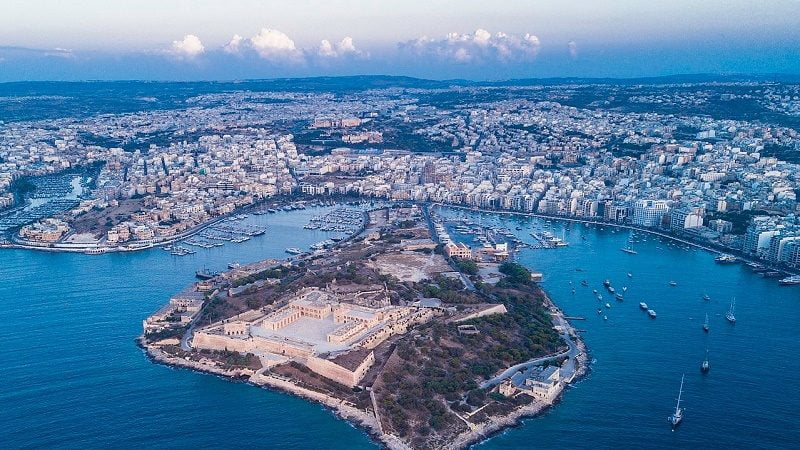The rough leaf-shape of Manoel Island could soon be a source of irony. The island’s Lazaretto withstood the plague for a year, but it may not resist the new plague of rampant development.
The PN administration granted a 99-year concession (with the approval of the entire parliament) to MIDI plc, granting the company the tip of the Tigné peninsula at the mouth of Marsamxett, as well as the harbour’s centrepiece: Manoel Island.
The plan was to transform l’Isoletto into a luxury “Mediterranean-style village”, consisting of a limited number of low-rise bungalows, each with their own garden. Fort Manoel was to be converted into a hotel. Immediately south, a revamp of Lazaretto would see it host a complex of residences, offices, restaurants, a casino and boutique hotel.
In total, 415 residential units were granted by the government in 1999 in an outline permit. But in 2010, MIDI was offered an unspecified compensation after that number was reduced to 375.
While Fort Manoel was being restored, all eyes were fixed on Tigné Point, with the island receiving little notice. Sixteen years later, the island was thrown into the spotlight after MIDI cut off access to the foreshore.
Protests ensued. Activists from Kamp Emerġenza Ambjent camped at the feet of the Fort Manoel steps, facing Valletta’s impressive bastions. Later, wire-cutters snapped at the fencing to open access to the island once again.
Conrad Borg Manché, Gżira’s young mayor, led protestors to what was arguably the most famous act of civil disobedience in recent Maltese history; arguable, not only because the foreshore is protected by statute, but also because Borg Manché, then a Labour lightweight, had the full support of Joseph Muscat himself (is it civil disobedience when the government is supporting you?).
The support of the Prime Minister was consistent throughout the entire saga. The Manoel Island Foundation was set up to negotiate with MIDI to reach an optimal solution between the interested parties: Borg Manché and Ralph Mangion for the residents of Gzira, lawyer and columnist Claire Bonello, and MIDI CEO Mark Portelli.
Muscat hailed the guardianship as “a model for the relationship between the community and the investor”. It received widespread support from environmentalists, opinion writers, and politicians. For Borg Manché, Manoel Island made his career and put him on the map as a rising star in the political scene. His Wikipedia page consists almost entirely of the MIDI saga.
The Foundation became the authoritative check on MIDI. In the public mind, MIDI was effectively brought to heel after the immense pressure put on it led to its “surrender”. Access to the foreshore was granted, casino plans were scrapped, and Fort Manoel was no longer going to be the hotel it was once earmarked to be. The plans now take up 8,000 square metres less than was previously envisaged.
Yet, the bungalows and gardens disappeared, making way for apartments. Additional retail space is being slated for development – now 8,449 square metres, up from 6,320 square metres. Yet, the 375 residential units suddenly shot up to 610 apartments, securing more return on investment and potentially enabling residential expansion.
This is happening over a significantly smaller surface area. In 2010, 375 units were going to be housed over almost 16,000 square metres. Now, the entire development is taking 8,000 square metres less space.
In the 90s, when these kind of deals were being struck – think also Portomaso, Fortina Hotel, Corinthia – the aim was to boost tourism and economy. Reducing the hotel and increasing the residential units is a better deal for investors, not necessarily the economy.
Then, the real deal walked in. A preliminary deal was struck for Tumas Group to take over the Manoel Island project (yes, the same Tumas Group whose chief executive was recently exposed owning a Dubai company intended to funnel commissions to Panama companies of Tourism Minister Konrad Mizzi and the Prime Minister’s chief of staff Keith Schembri).
With Portomaso and additional Paceville applications, not to mention the Mrieħel plans, Tumas Group is the only company to have such a rich high-rise portfolio. Tumas Group’s influence stretches across the Maltese islands. Delimara might be their crowning achievement. The bomb-shell revelation of 17 Black now casts a shadow over every hand they’ve ever shaken.
That includes MIDI’s. A few weeks ago, the Times of Malta announced the planned take-over by Tumas Group. A figure of €100m was mentioned, equal to over 60% worth.
MIDI reacted with a disclaimer, which was wise considering that sales above 40% require permission, according to the parliamentary concession.
Technically, the agreement is for a new, separate joint venture rather than the concession itself (legal manoeuvring). The Times of Malta article led to a 1% jump in the MSE’s stocks.
Interestingly, and perhaps unsurprisingly, changes to the Manoel Island development were announced shortly afterwards. Alternattiva Demokratika’s Arnold Cassola claimed that plans to increase building heights had been kept secret for up to two months. As public unease increased, tThe Foundation immediately came forward to give assurances that the overall building volume would remain unchanged. This assertion was backed up by plans published by MIDI.
At this stage, it helps to remember how Tigné was developed. The project progressed one block at a time. But each block was progressively different to the original plans, much to the new residents’ dismay. This was enabled by the Planning Authority’s flexibility with permits.
A closer look at the revised Manoel Island plans reveal that some space has been cleared of buildings overlooking the planned land reclamation side on the Strand. This is to compensate for a slight bumping up of existing buildings. No permits have yet been issued, leaving open the possibility of surprises à la Tigné.












